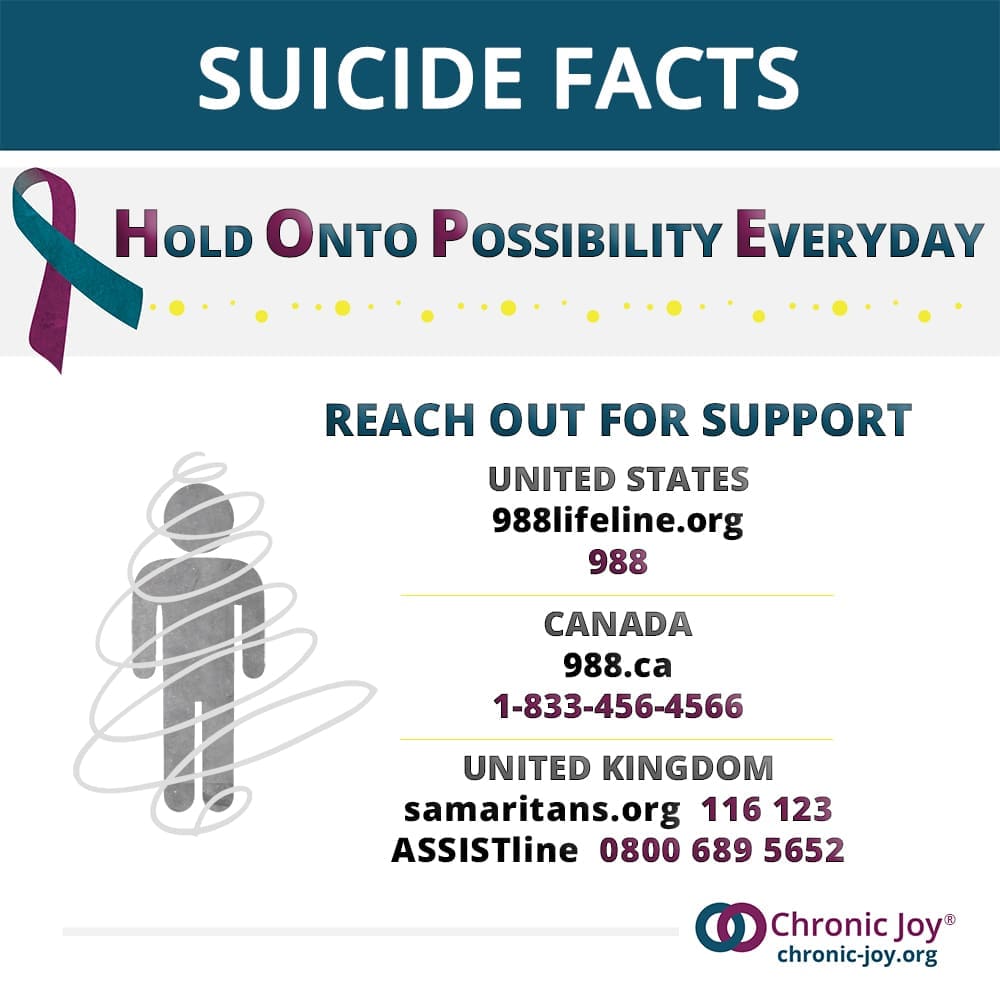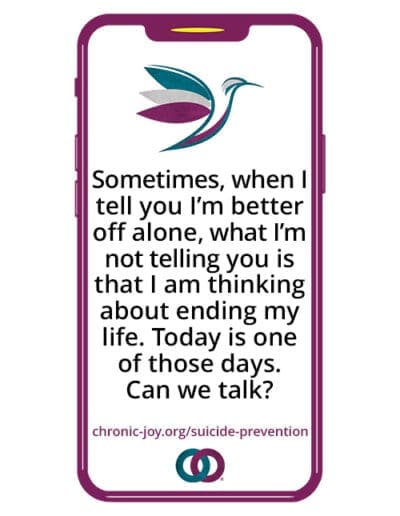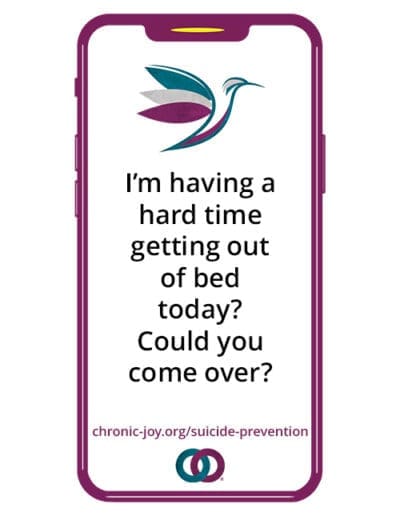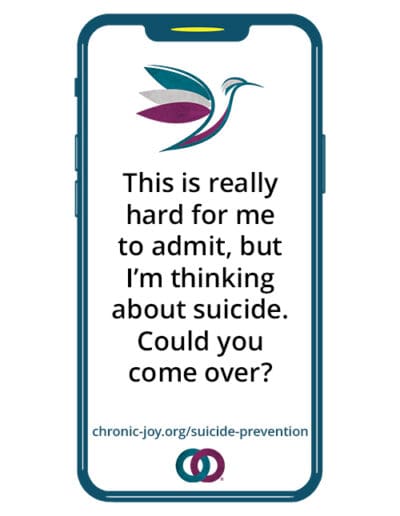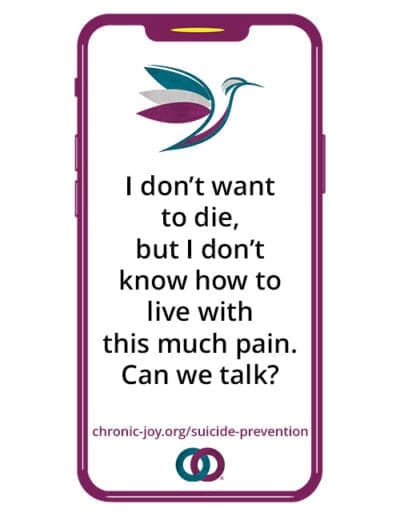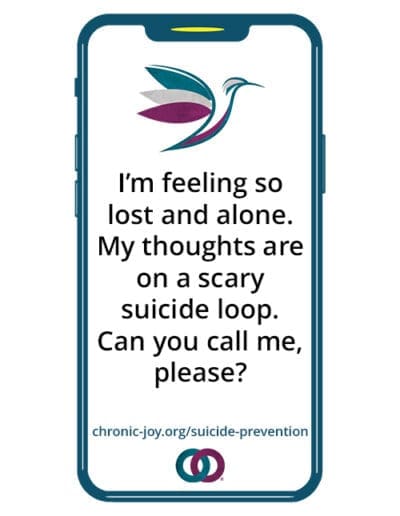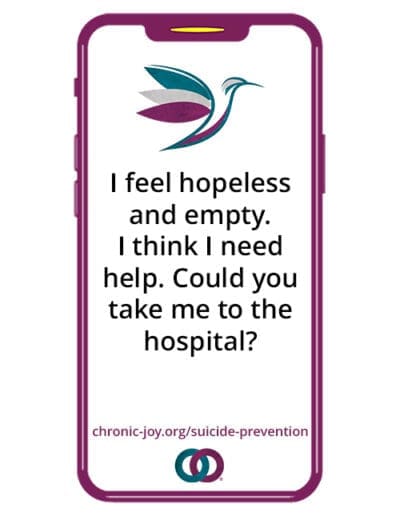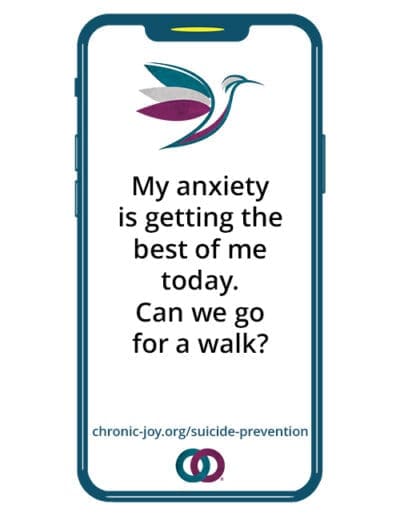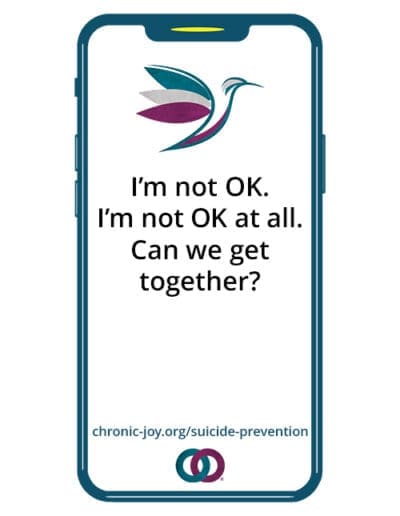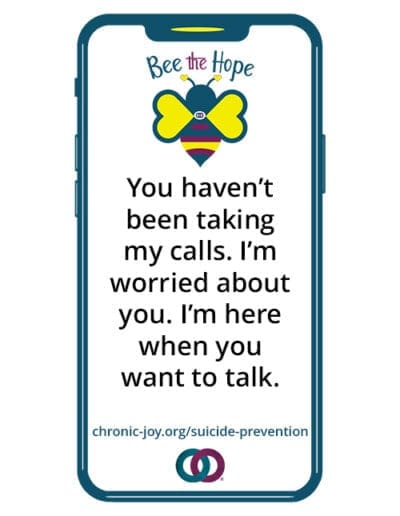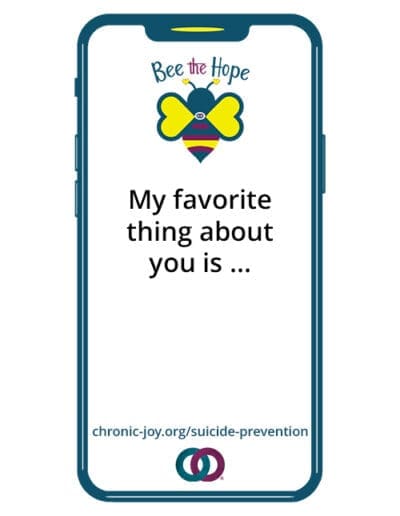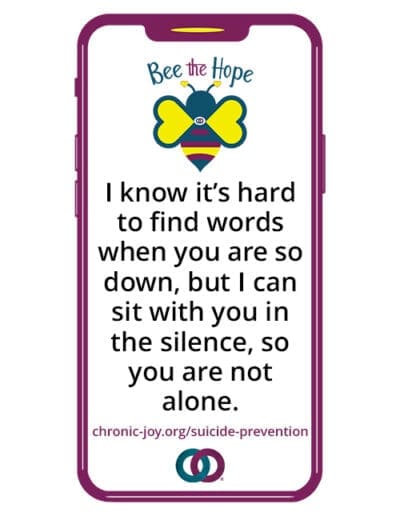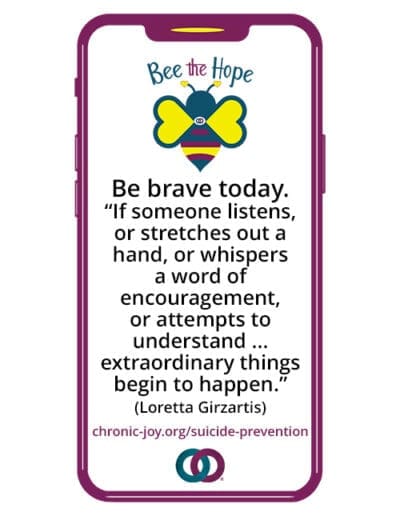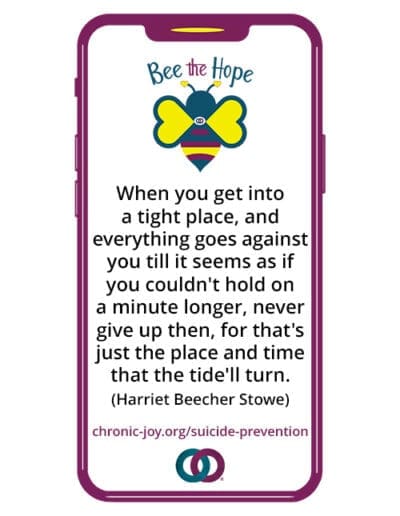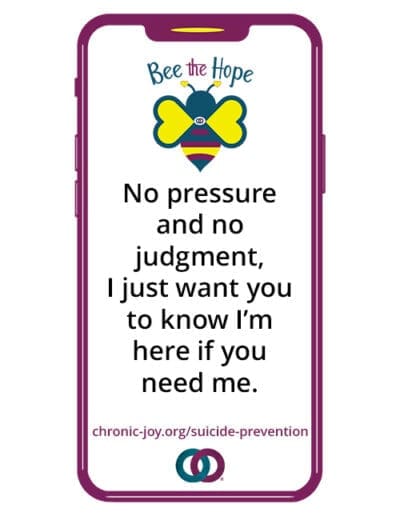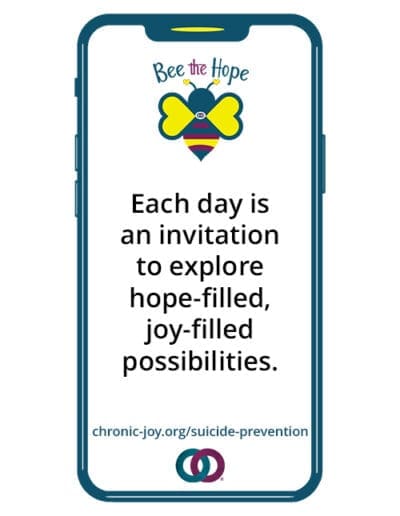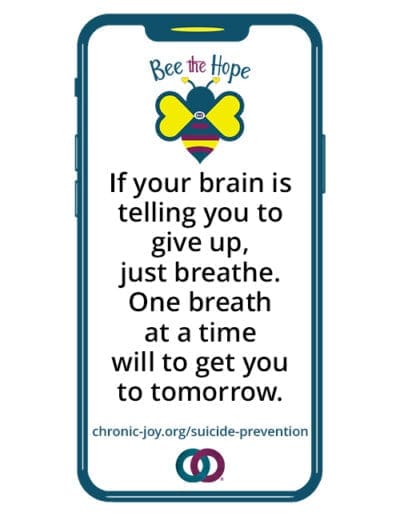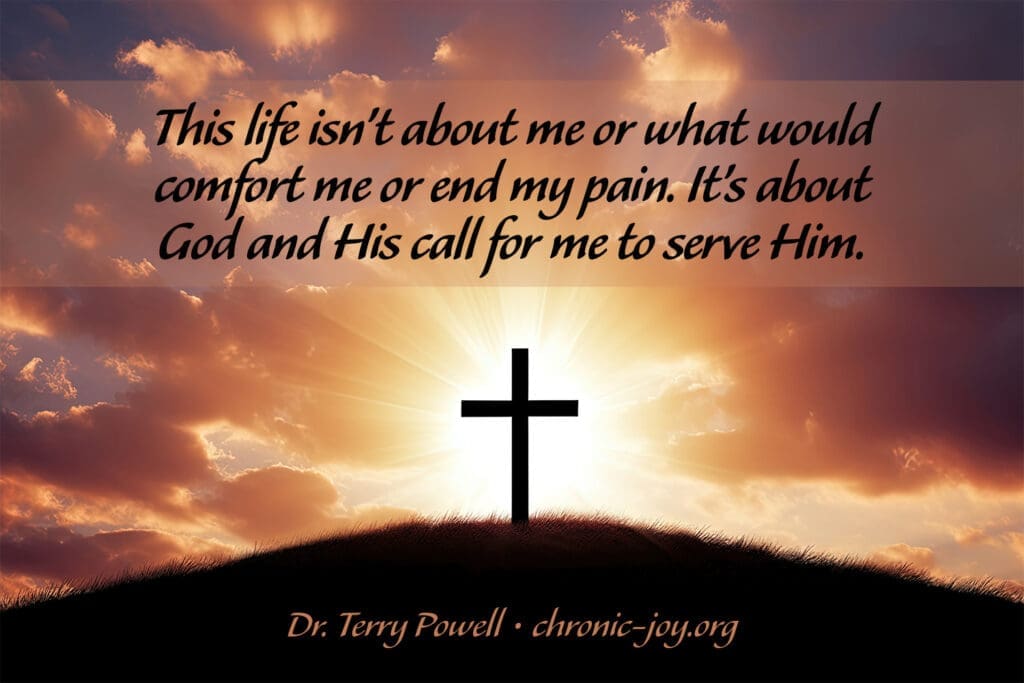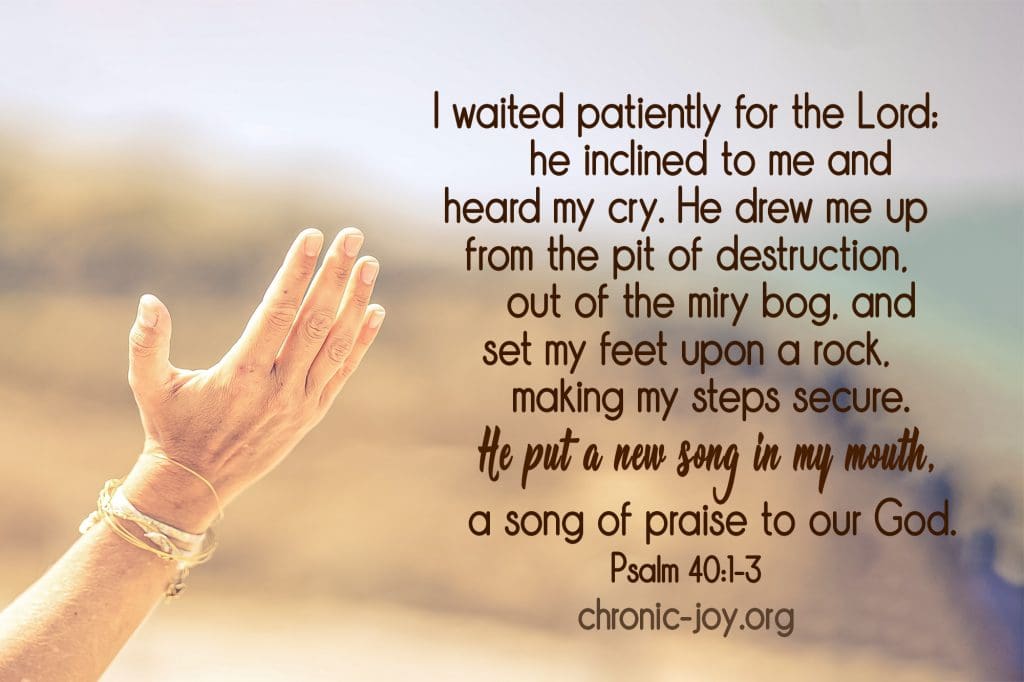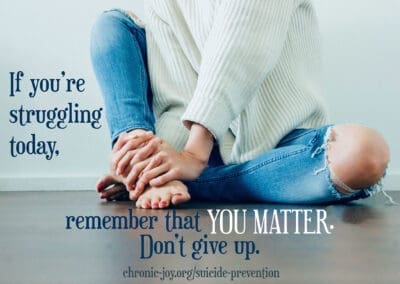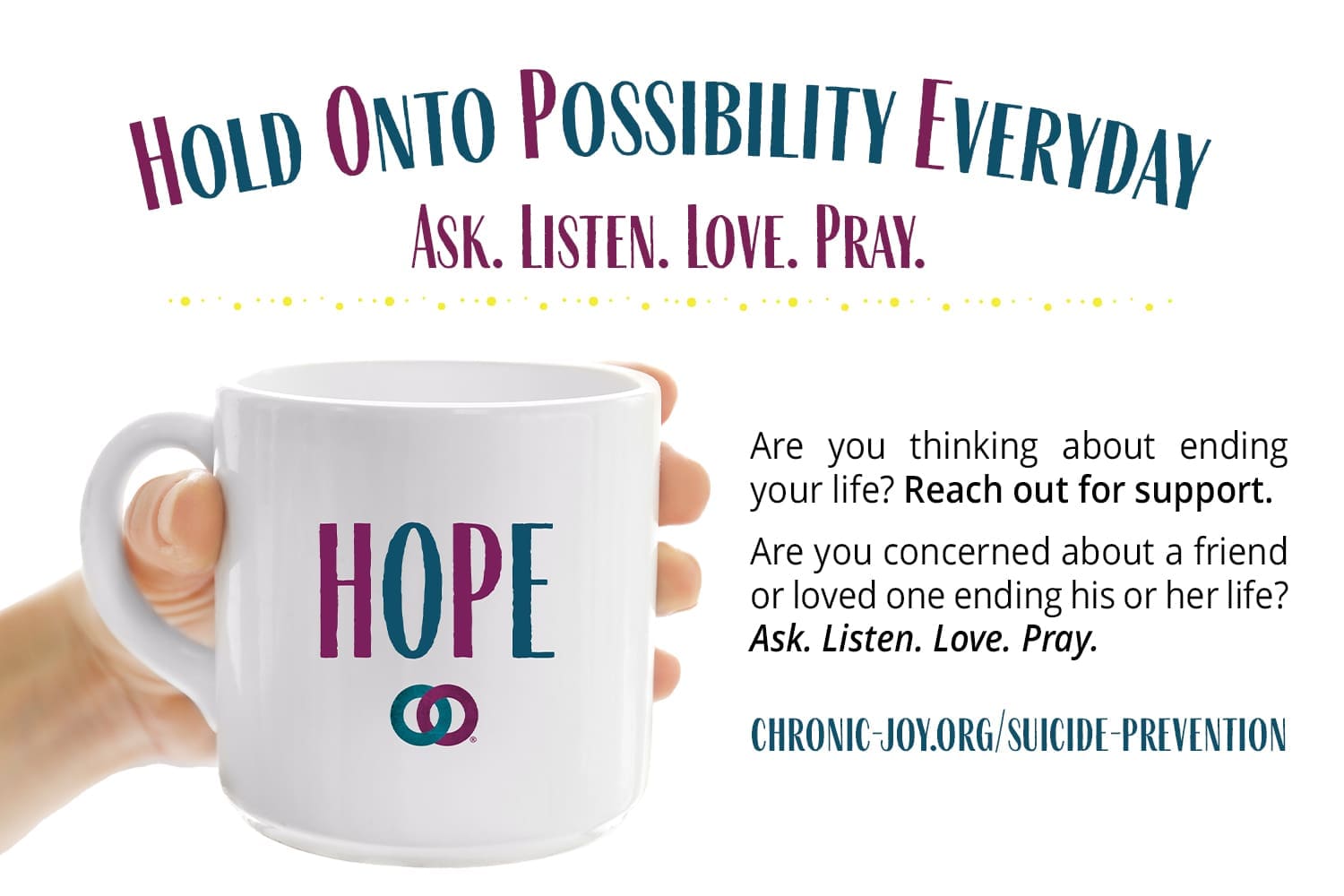
SUICIDE PREVENTION
Hold Onto Possibility Everyday
Are you thinking about ending your life? Reach out for support.
Are you concerned about a friend or loved one ending his or her life? Ask. Listen. Love. Pray.
So do not fear, for I am with you; do not be dismayed, for I am your God. I will strengthen you and help you; I will uphold you with my righteous right hand. (Isaiah 41:10)
Envelope of Possibility
REQUEST your hope-filled resources.
Limit one – US, CA & UK.
Reach Out For Support
UNITED STATES
988 Lifeline
988 or 1-800-273-8255
CANADA
UNITED KINGDOM
ASSISTline
0800 689 5652
HELP ME
Living with chronic illness, mental illness, chronic pain, or disability can sometimes lead us to consider suicide because we so desperately want the pain to end. Yet even in our darkest moments, God promises that there is hope.
At Chronic Joy, HOPE is an acronym for Hold Onto Possibility Everyday. You might think we’ve misspelled everyday, and you’d be correct. Still, we intentionally linked those two words, with no space between them, because when we Hold Onto Possibility Everyday, we leave no space for darkness, no foothold for the devil, and no opportunity for dark thoughts to pierce our hearts. Connected, the word everyday is like a strong gate; it invites us to rest in God’s protection and be curious.
Curiosity shifts our perspective, inviting us into the everyday possibilities of wonder and joy. It calls us to bravely step back from our pain and ask ourselves questions like:
- What am I feeling right now?
- How can I best describe what I’m feeling?
- Am I afraid of how I feel?
- What is the pain trying to tell me?
- What might happen if I surrendered my pain to God?
- Am I willing to see things differently?
Curiosity:
- calms the nervous system.
- triggers feel-good hormones.
- can expand our empathy.
- improves memory.
- encourages creativity.
- is often a language of love and can deepen relationships.
- fosters resilience.
- enhances the quality of our lives.
PRACTICE CURIOSITY
No matter how you’re feeling today, set a timer for two minutes and step outside. Be curious, engage your senses, and pray: Show me what you want me to notice, Lord. Amen.
WHEN YOU CAN’T FIND THE WORDS
If you need help today, reach out. When you can’t find the words, simply copy the text beneath one of the images below, paste it into an email, and hit send.
Suicide Prevention – What I’m Not Telling You
Sometimes, when I tell you I’m better off alone, what I’m not telling you is that I am thinking about ending my life. Today is one of those days. Can we talk?
Suicide Prevention – Hard Time Getting Out of Bed
I’m having a hard time getting out of bed today? Could you come over?
Suicide Prevention – Hard to Admit
This is really hard for me to admit, but I’m thinking about suicide. Could you come over?
Suicide Prevention – I Don’t Want to Die
I don’t want to die, but I don’t know how to live with this much pain. Can we talk?
Suicide Prevention – Alone and Scared
I’m feeling so lost and alone. My thoughts are on a scary suicide loop. Can you call me, please?
Suicide Prevention – Bad Day
I feel hopeless and empty. I think I need help. Could you take me to the hospital?
Suicide Prevention – Can We Go for a Walk?
My anxiety is getting the best of me today. Can we go for a walk?
I’ve Lost Someone
The death of a loved one is difficult, but when that loved one chooses to end his or her life, it’s shocking—and the shock and pain return again and again. We can find ourselves in a circle of chronic grief, encountering anger, depression, numbness, anxiety, fear, and shame. We wonder how we missed the signs and why we couldn’t be enough to keep our loved ones safe. Honestly, we are never the same. If you are in the midst of grief, click here for free resources.
Jesus, my heart is broken. I’m deeply wounded, and the hole that [name] left is gaping. Some days, I just can’t breathe. Help me to live with grief until the wild grief I feel turns into the love I remember sharing. I need You so desperately, Lord. In Your safe name, amen.
Help Someone: Ask. Listen. Love. Pray.
SHOW UP AND KEEP WATCH
We are called to love one another deeply from the heart. (1 Peter 1:22)
The most important thing we can do for a friend or loved one who is struggling with suicidal thoughts is to show up and keep watch.
In Matthew 26:38, Jesus tells His disciples: My soul is overwhelmed with grief, to the point of death. Stay here and keep watch with Me. We know what happens next: the disciples don’t keep watch; they fall asleep. Their inaction is not so different from our own. We may think, “I have no idea what to say or do. What if I say the wrong thing? Could I make it worse?” Being face-to-face with a loved one’s deepest pain can be emotionally paralyzing—but there are specific ways we can help.
TALK OPENLY ABOUT SUICIDE
When we ask a loved one if they are thinking about suicide, we open the door to hope. It might be uncomfortable, but if we continue to listen and ask questions with brave curiosity (questions that seek to understand, not to reframe or shift perspective, but to learn more), our loved one may express their feelings. When they are willing to talk about their pain, there is hope and a fragile will to live, even if they can’t see it yet.
TOOLS FOR SUICIDE PREVENTION
1. ASK
Is someone you love thinking of ending his/her life? It can be a tough question to ask, but asking a loved one if he or she is suicidal can prevent the loss of a precious life.
2. KEEP THEM SAFE
An essential part of suicide prevention is removing access to items that someone may use to end a life. Ask your loved one if they have a plan to end their life. Start the conversation. Listen. Ask. Love.
3. BE THERE
Listen, lean in, and learn what your loved one is feeling and thinking. Acknowledging and talking about suicide may help reduce suicidal thoughts.
4. REACH OUT FOR SUPPORT
Help your loved one create a Suicide Safety Plan. Include hotlines, chats, websites, and phone numbers for family, friends, pastors, and mental health professionals. Place them somewhere for easy access.
5. PRAY
Offer to pray with your loved one and continue to pray for them.
6. FOLLOW UP
Contacting your loved one after a crisis (just to check in) makes a big difference. Studies have shown that the risk of suicide decreases when we extend care and concern.
WHEN YOU DON’T KNOW WHAT TO SAY
If you don’t know what to say, begin with the text beneath one of the images below, make it your own, and reach out to someone struggling. For even more ideas, check out #ConnectByText.
Suicide Prevention – Not Taking My Calls
You haven’t been taking my calls. I’m worried about you. I’m here whenever you want to talk.
Suicide Prevention – Sit With You In Silence
I know it’s hard to find words when you are so down, but I can sit with you in the silence, so you are not alone.
Suicide Prevention – Be Brave Today
Be brave today. “If someone listens, or stretches out a hand, or whispers a word of encouragement, or attempts to understand a lonely person, extraordinary things begin to happen.” (Loretta Girzartis)
Suicide Prevention – Hold On A Minute Longer
“When you get into a tight place, and everything goes against you till it seems as if you couldn’t hold on a minute longer, never give up then, for that’s just the place and time that the tide’ll turn.” (Harriet Beecher Stowe)
Suicide Prevention – Here If You Need Me
No pressure and no judgment, I just want you to know I’m here if you need me.
Suicide Prevention – Hope-Filled Possibilities
Each day is an invitation to explore hope-filled, joy-filled possibilities.
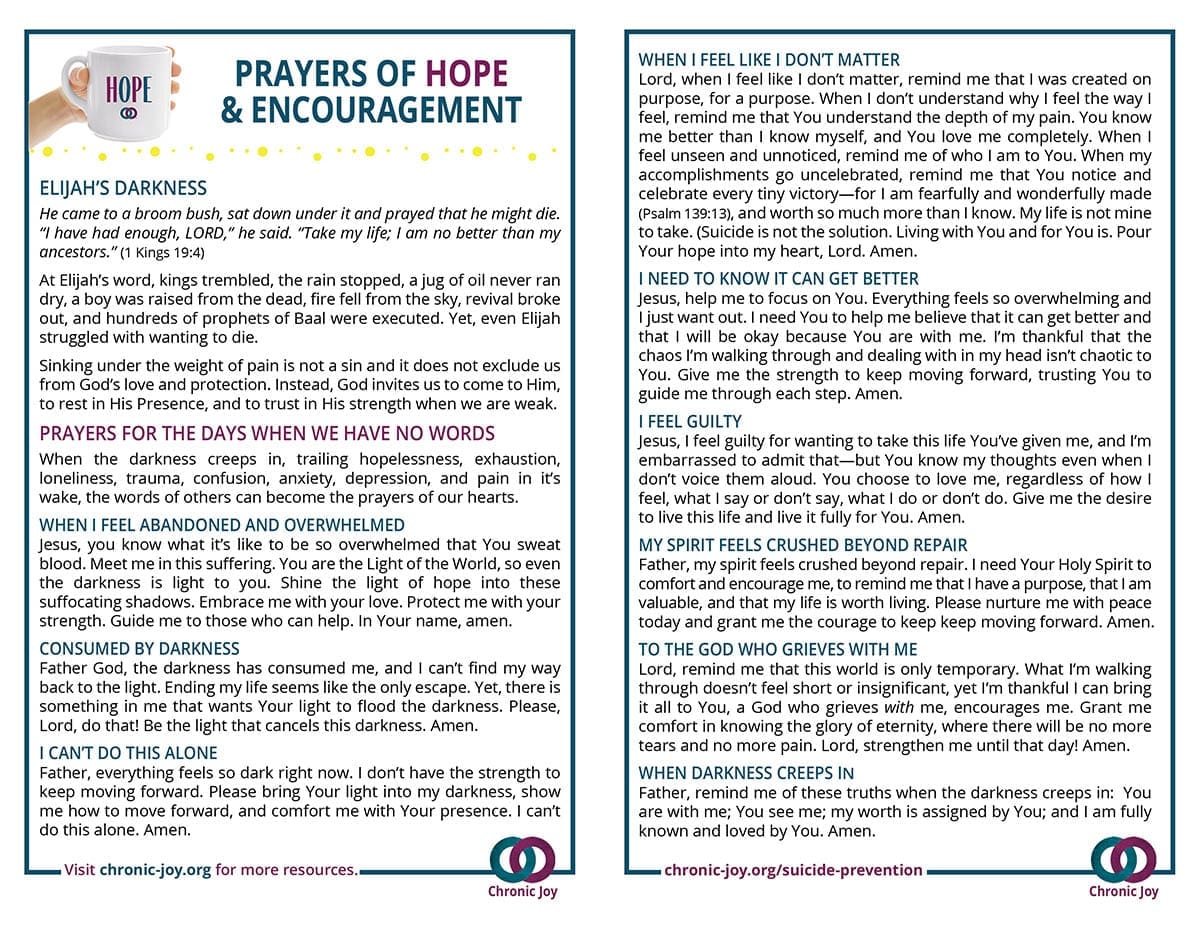
Prayers of Hope & Encouragement
Sinking under the weight of pain is not a sin, and it does not exclude us from God’s love and protection. Instead, God invites us to come to Him, to rest in His presence, and to trust in His strength when we are weak.
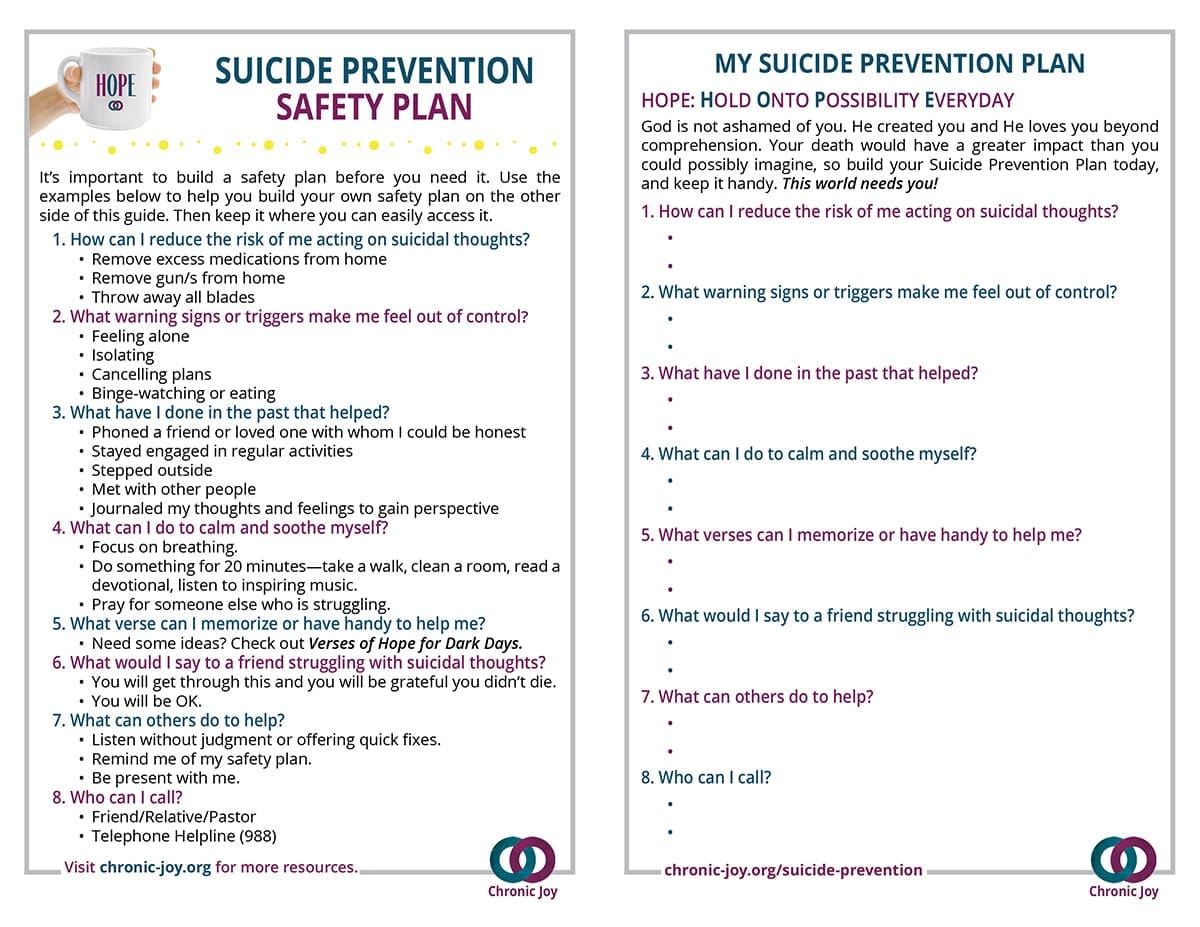
Suicide Prevention Safety Plan
God is not ashamed of you. He created you, and He loves you beyond comprehension. Your death would have a greater impact than you could possibly imagine. So, build your Suicide Prevention Plan today, and keep it handy. This world needs you!
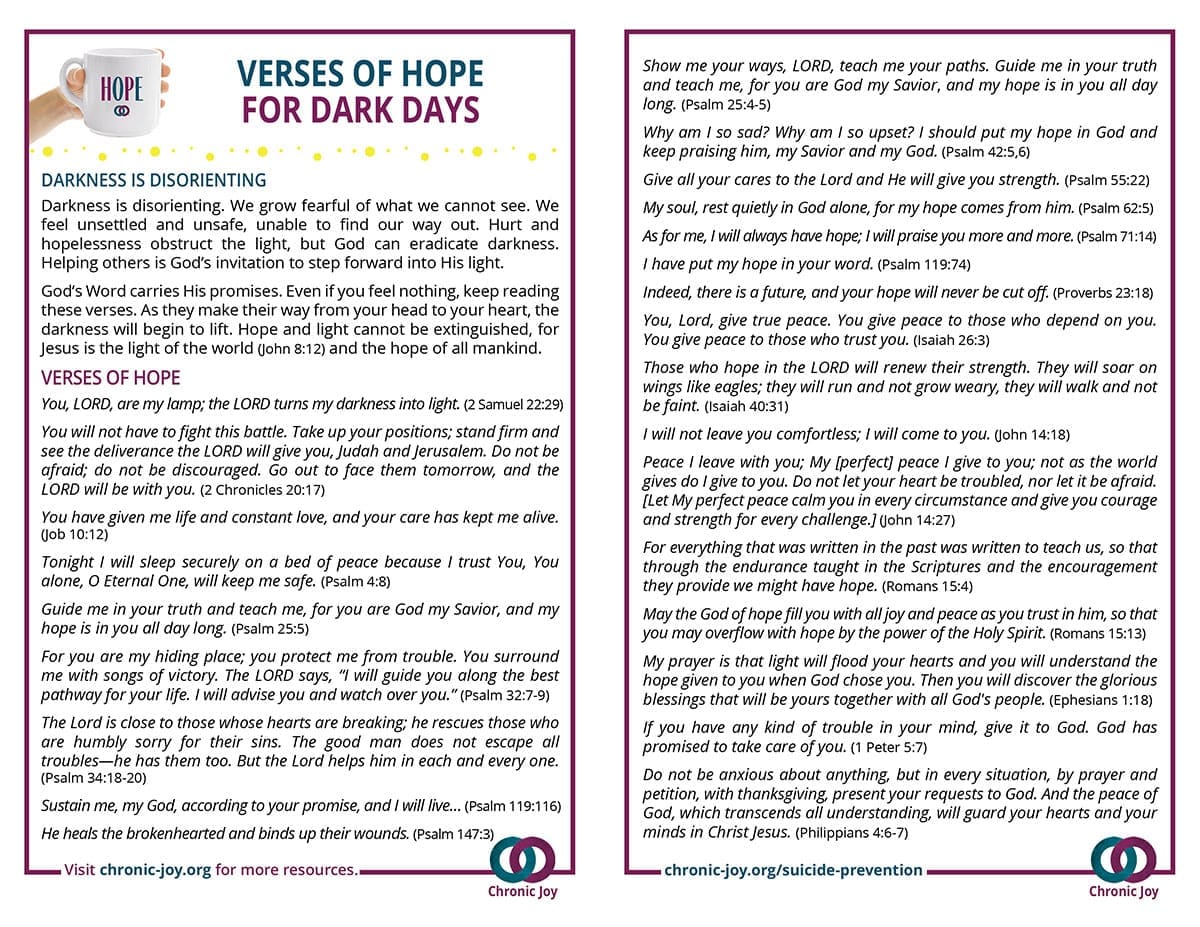
Verses of Hope for Dark Days
Darkness is disorienting. We grow fearful of what we cannot see, feel unsettled and unsafe, and are unable to find our way out. Hurt and hopelessness obstruct the light, but God can eradicate darkness. Helping others is God’s invitation to step forward into His light.
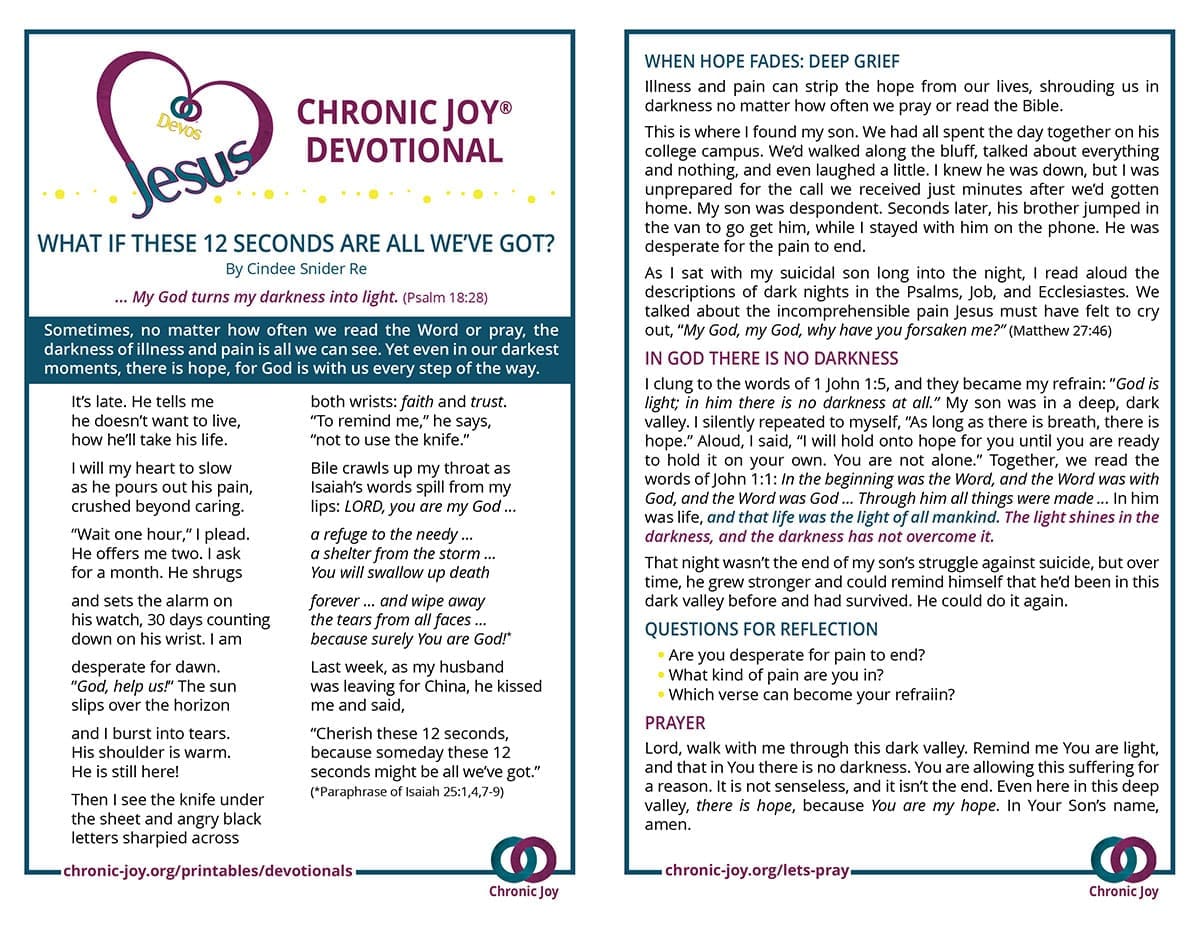
What If These 12 Seconds Are All We've Got?
Sometimes, no matter how often we read the Word or pray, the darkness of illness and pain is all we can see. Yet even in our darkest moments, there is hope, for God is with us every step of the way.
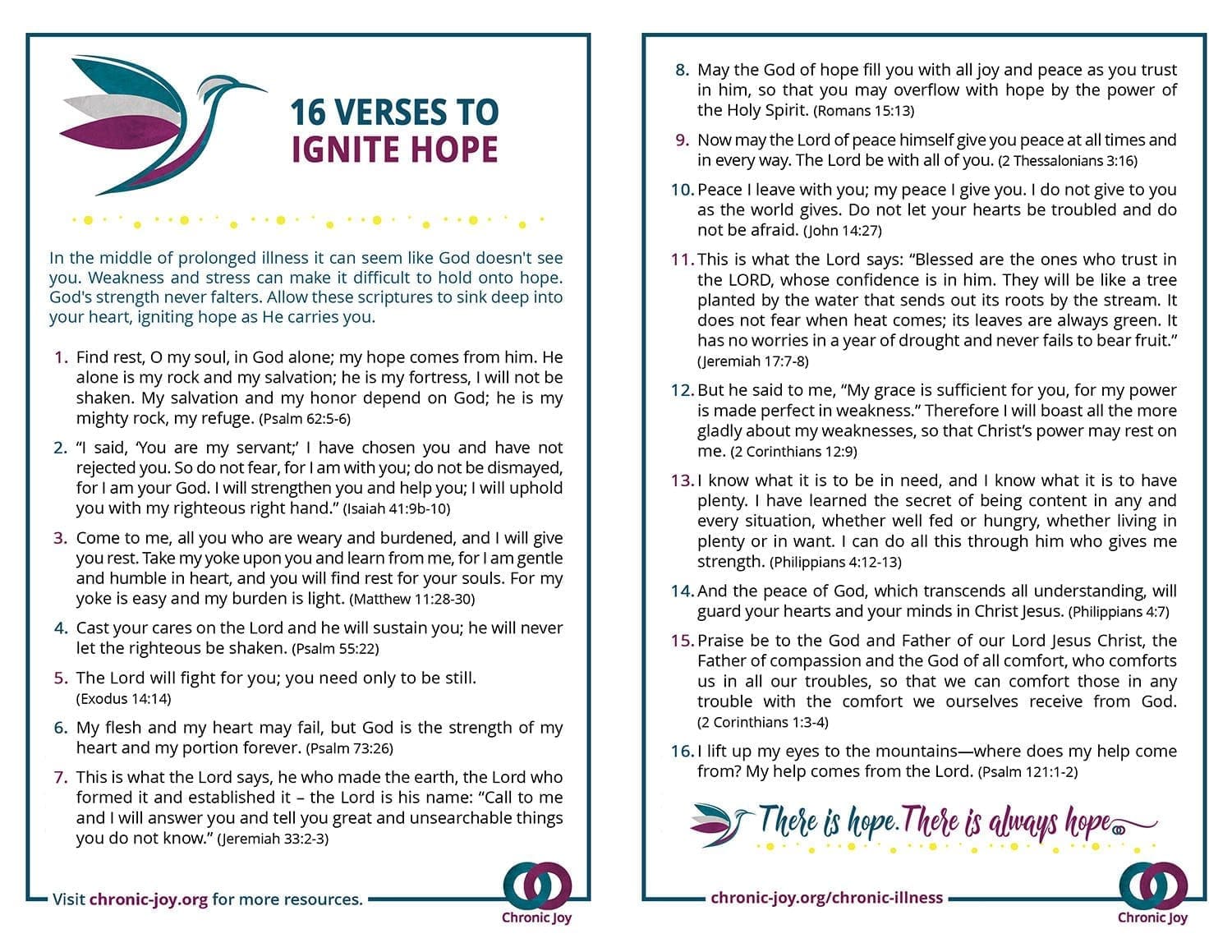
16 Verses to Ignite Hope
In the middle of prolonged illness, it can seem like God doesn't see you. Weakness and stress can make it difficult to hold onto hope. However, God's strength never falters. Allow these scriptures to sink deep into your heart, igniting hope as He carries you.
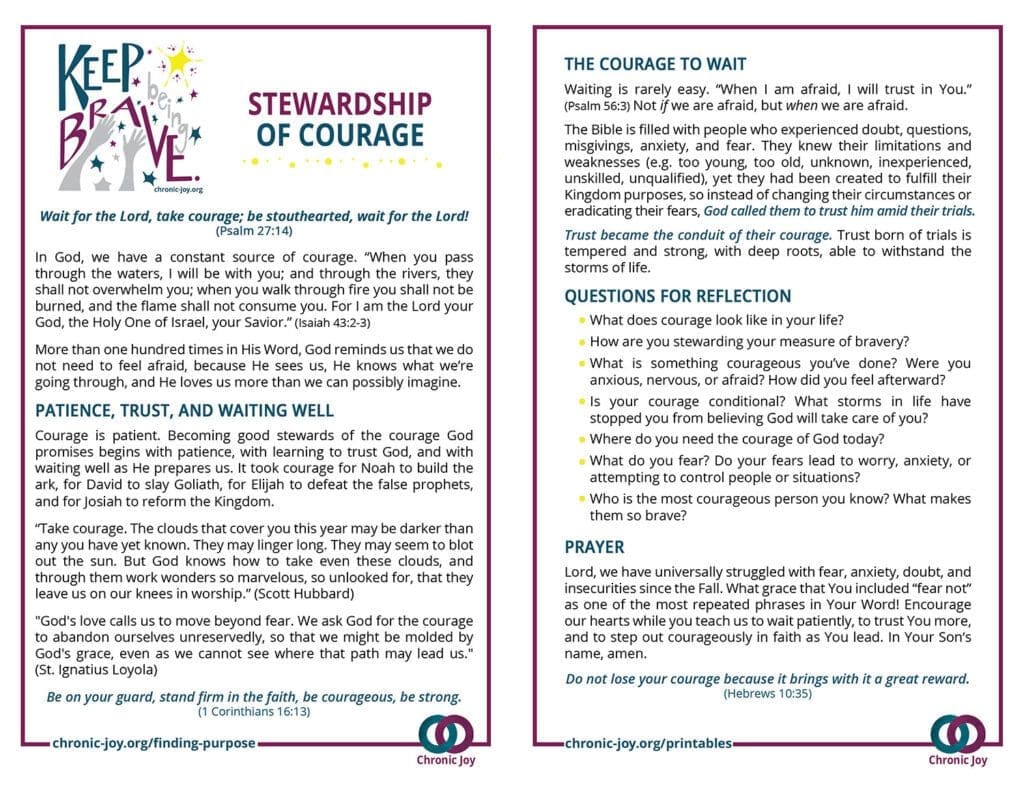
Stewardship of Courage
The stewardship of courage begins with a deep faith in God, is accessed by prayer, and is lived out in patient waiting and hopeful trust.
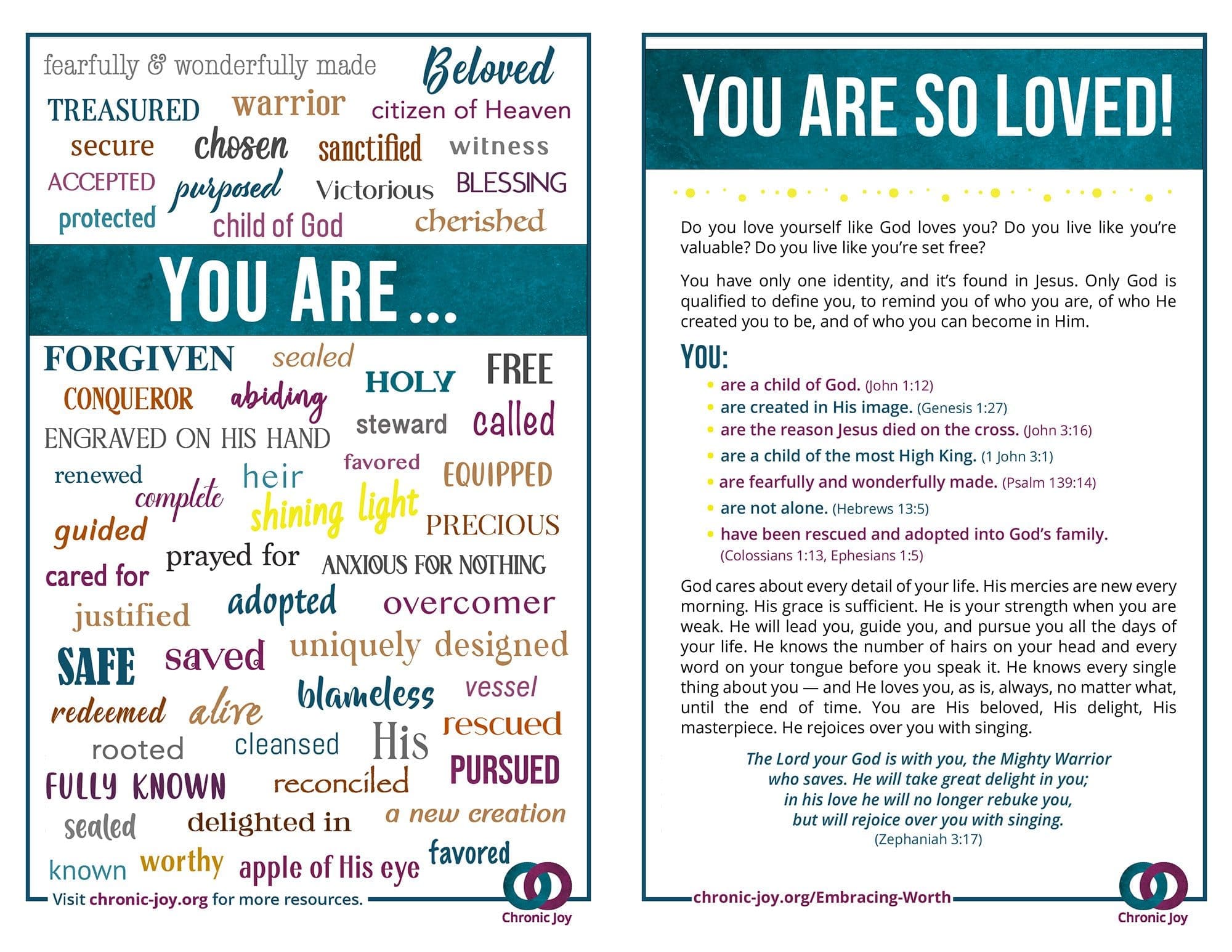
You Are So Loved
Do you love yourself as God loves you? Do you live as if you’re valuable? Do you live as if you’re set free?
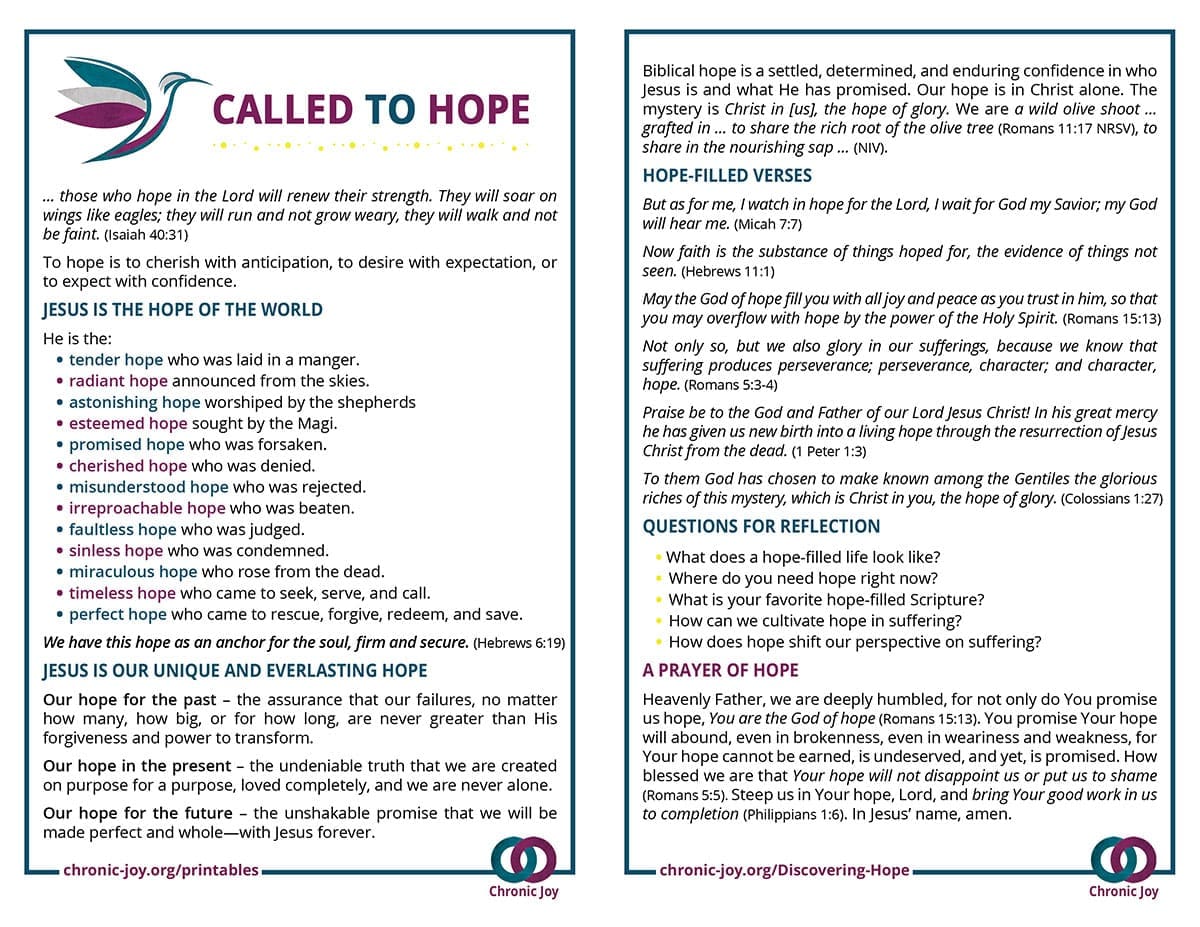
Called to Hope
Biblical hope is a settled, determined, and enduring confidence in who Jesus is and what He has promised. Our hope is in Christ alone. The mystery is Christ in us, the hope of glory. (Colossians 1:27)
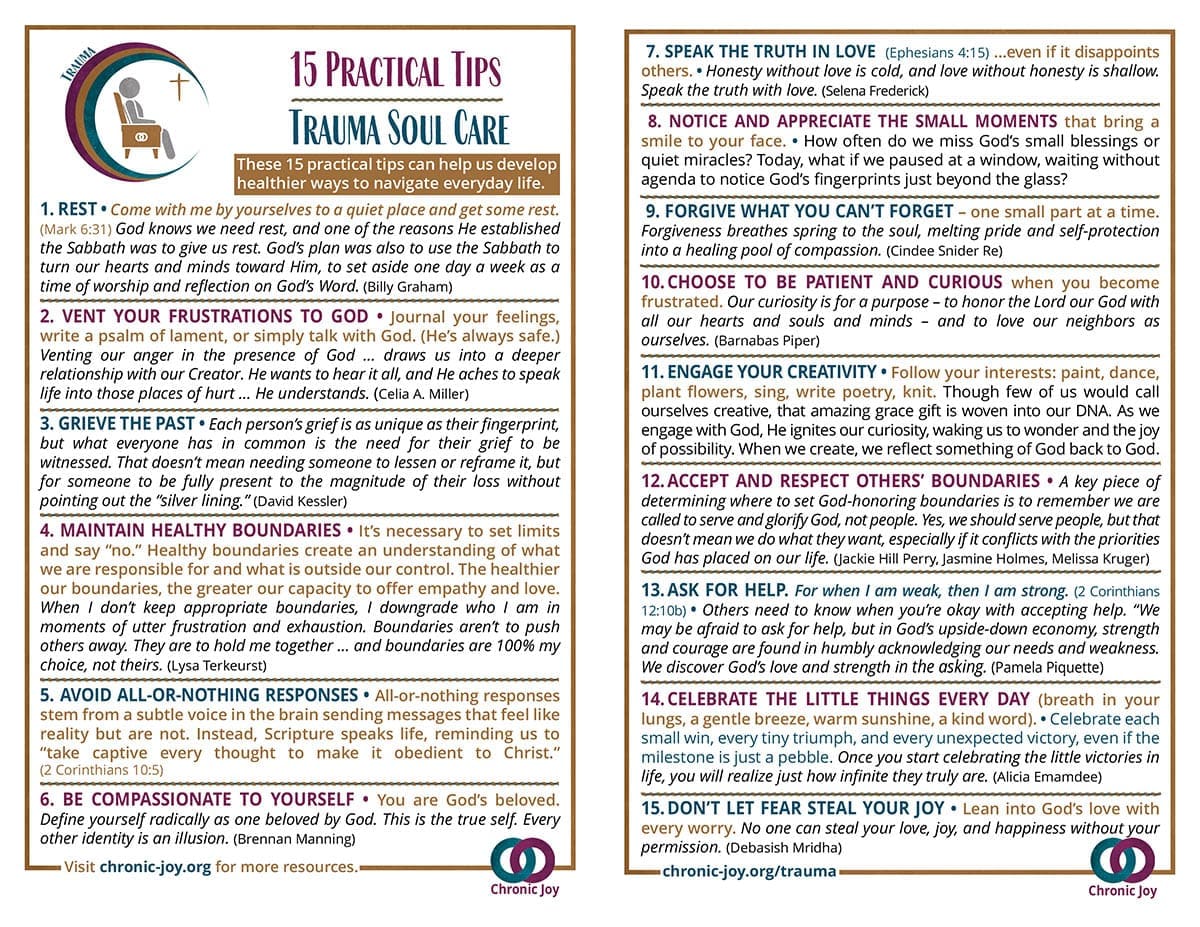
15 Practical Tips • Trauma Soul Care
These 15 practical tips can help us develop healthier ways to navigate everyday life.
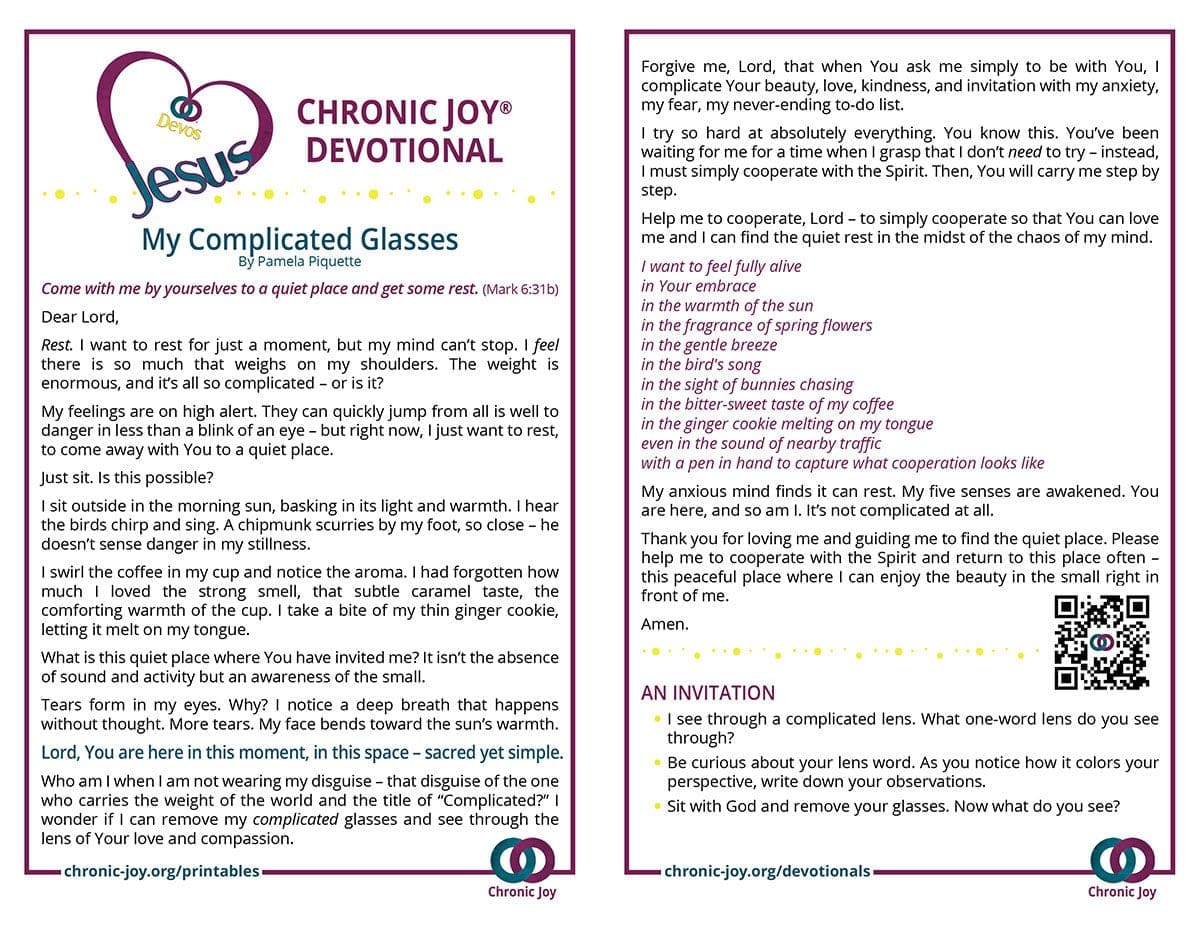
My Complicated Glasses • A Prayer
Rest. I want to rest for just a moment, but my mind can’t stop. What is this quiet place where You have invited me? It isn’t the absence of sound and activity but an awareness of the small. Lord, You are here in this moment, in this space – sacred yet simple.
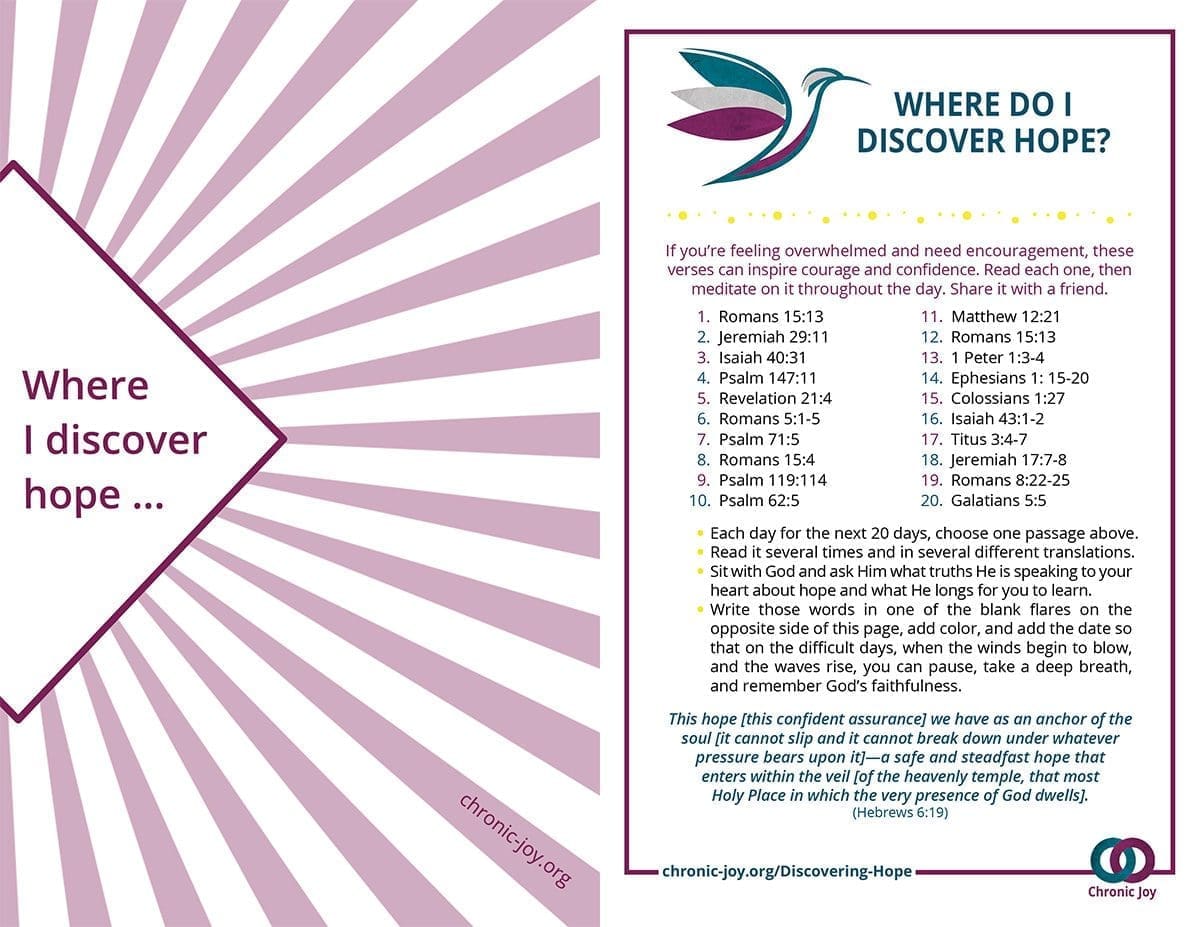
Where do I discover hope?
If you feel overwhelmed and need encouragement, these verses will give you courage and confidence. Why not meditate on them throughout your day and share them with your friends?
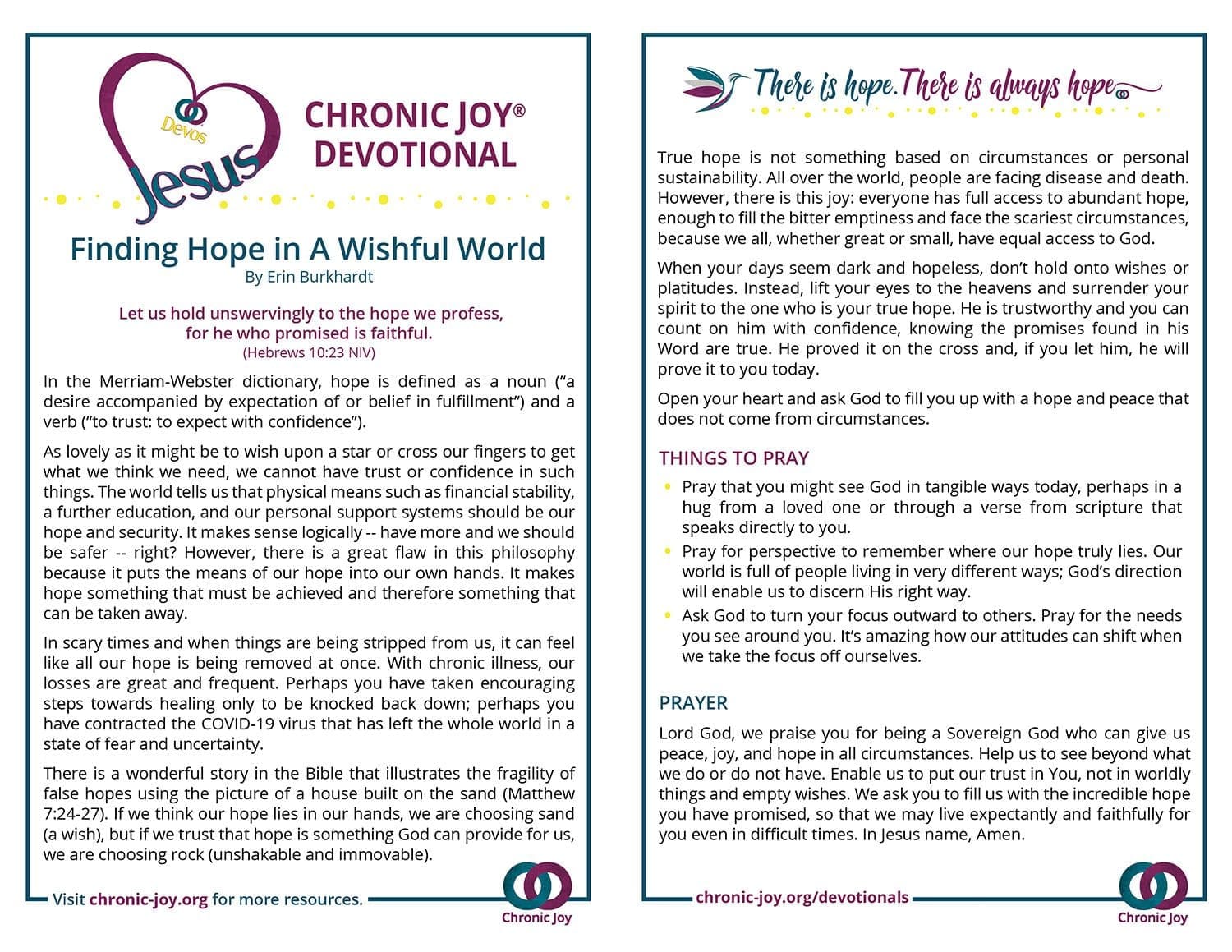
Finding Hope in A Wishful World
It’s a difficult time for humanity. Recent events have made the world desperate for security, looking for hope in all kinds of places when it can only be found in Christ.
Books We Love

DISCOVERING HOPE: Beginning the Journey Toward Hope in Chronic Illness
Cindee Snider Re
This 10-chapter study invites participants to experience radical hope and compassionate change in a life with chronic illness.
No matter how dark the days, how wild the storm, how deep the valley, or how long the winter, there is hope.
There is always hope.

FINDING PURPOSE: Rediscovering Meaning in a Life with Chronic Illness
Cindee Snider Re
What if purpose looks different than we believe?
In this 10-chapter study, author Cindee Snider Re invites participants to release cultural and traditional definitions of purpose and, instead, embrace God's timeless definition. Rooted in His Word, His definition is as refreshing as a gentle spring rain.
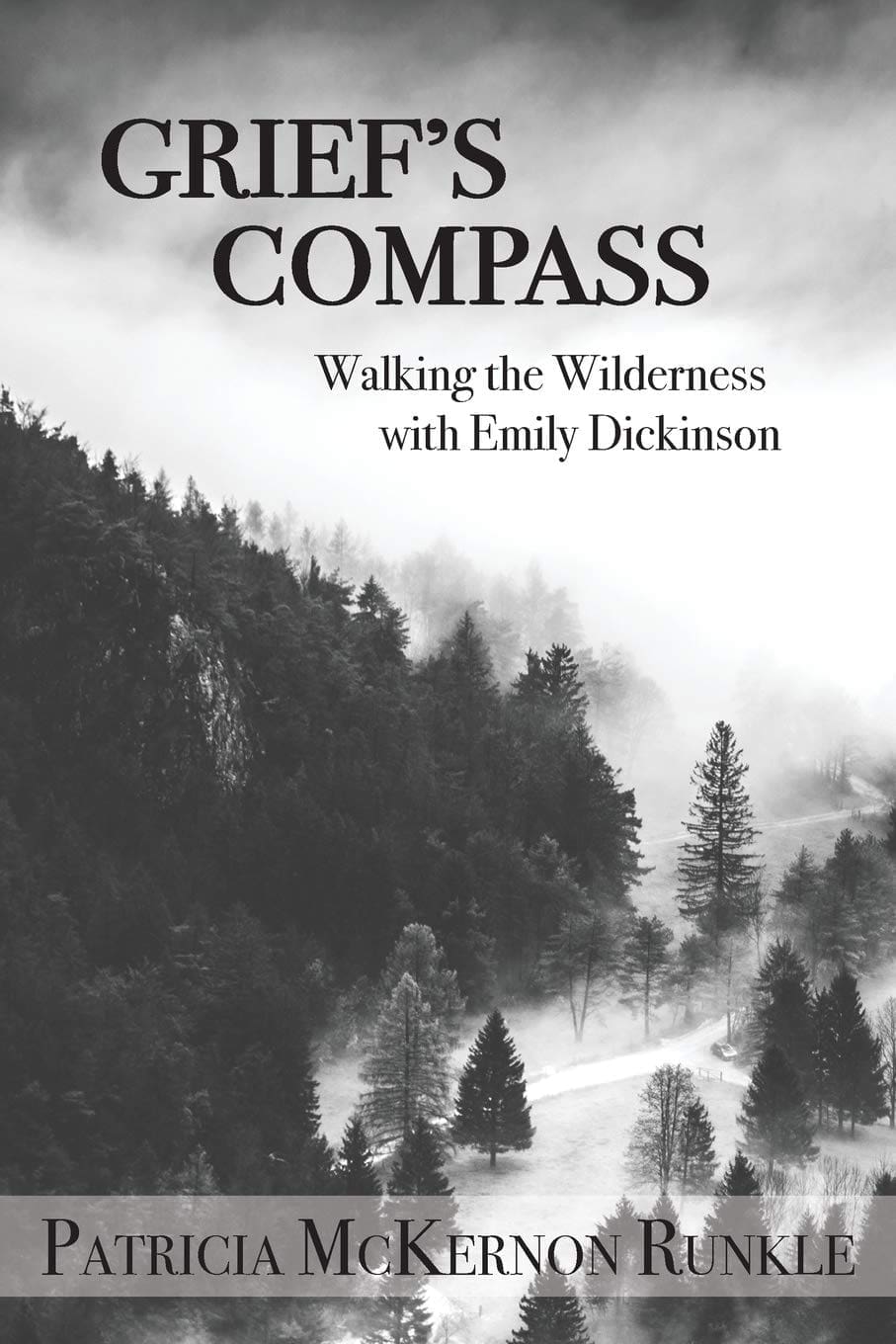
Grief's Compass: Walking the Wilderness with Emily Dickinson
Patricia McKernon Runkle
The Wilderness is new–to you. Master, let me lead you. Emily Dickinson wrote these words to her mentor shortly after his wife died. After the devastating loss of her brother, Patricia McKernon Runkle wrote Grief’s Compass using Dickinson as her guide. As she charts a path through the holy madness of grief and the grace of healing, she finds points on a grief compass—and lines from Dickinson that illuminate them.
THE WONDERFUL LAND OF AFFLICTION: Exploring Adversity through Allegory
Barbara Coleman
Have you ever met a suffering person who was still smiling? Do you understand why distress and anguish crush some folks and not others? Come and meet the pilgrims in this Land of Affliction who have learned the eternal key to being joyful, hopeful, and patient through peril.
The Amazon buttons are affiliate links, which means if you click on the link and purchase the item, Chronic Joy will receive an affiliate commission.
Suffering invites us to place our hurts in larger hands …
Suffering invites us to place our hurts in larger hands … calling us to share in God’s suffering love for a hurting world. (Henri Nouwen)
I have made you and I will carry you; I will sustain you …
I have made you and I will carry you; I will sustain you … (Isaiah 46:4)
God is with you, especially during your darkest hours. He understands your depression and will walk beside you through it.
God is with you, especially during your darkest hours. He understands your depression and will walk beside you through it. (Lesli White)
He left the 99 to rescue me.” If life is hard, hold on and remember how very precious you are.
“He left the 99 to rescue me.” If life is hard, hold on and remember how very precious you are.
God loves you just as much in your worst moments as He does in your best.
God loves you just as much in your worst moments as He does in your best. (Holley Gerth)

